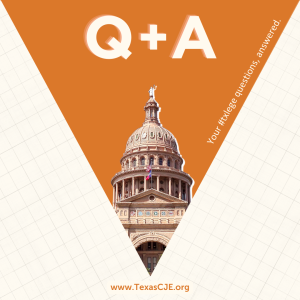
The 88th regular session of the Texas Legislature is coming to a close in just two weeks, and it’s been another intense one. For someone new to the “lege”—or even someone like me, in their third session! —it can be hard to keep track of what’s going on. There are bills, budget amendments, points of order, committee subs, and more. And because the session is so short (just 140 days every other year), things tend to move quickly.
The Texas Capitol is our Capitol, and the legislative process should be accessible to everyone. That’s why, each month during this session, we’ve been sharing a Q&A answering common questions about how the legislature works. We’re sharing all four of our 2023 Q&A’s below in hopes that they help you navigate these last few days, the veto period, and beyond!
Question: How do committees work at the legislature? Why does it matter?
Answer: Each chamber of the legislature (the House and the Senate) has its own committees, and each committee focuses on specific issues. Many committees exist every session, but there are also special and select committees that address more timely issues. Committee members are determined by the leader of each chamber. In the Senate, that’s the Lieutenant Governor; in the House, it’s the Speaker of the House. Each committee has a chair, and legislation gets assigned to specific committees based on their focus—like criminal justice, education, or health and human services.
Question: What happens after a bill is filed?
Answer: At the Texas Legislature (which, as a reminder, meets in a regular session from January through May of odd-numbered years), bills can be filed up to 8 weeks before the session begins. Lawmakers can continue filing bills until the 60th day of the session (this year: March 10), with a few exceptions for local and emergency items. When there are a lot of bills, like there are for this session, lawmakers are encouraged to file them as early as possible. Once the bill is officially filed, it will be assigned a number based on whether it originates in the House or Senate (for instance, House Bill 1446 or Senate Bill 207, which are HB 1446 and SB 207 for short). After that, you’ll be able to view the bill on the legislature’s website.
Next, the bill will be assigned to the most relevant committee—most of the bills that TCJE works on end up in committees like Senate Criminal Justice or House Juvenile Justice and Family Issues. Each committee calls hearings on different bills; members can hear the version of a bill that was originally filed, or they might consider an updated version called a “committee substitute.” If the committee votes to move the bill forward, the bill gets put on a list to be considered by the full chamber (House or Senate). And if that chamber approves it, the bill moves to the other side of the legislature and the process starts all over again! The complexity of this system is why we often say a bill “dies” during the process; it might never receive a hearing at all, or it may be approved by one chamber too late to move in the other chamber before the session is over. But if the bill passes both chambers, it advances to the Governor’s desk for final consideration—where it can be passed into law or vetoed (rejected).
Question: What is a companion bill?
Answer: Sometimes, two versions of the same bill are filed during one legislative session, with one in the Senate and one in the House. This is done to get the bill passed as quickly as possible, since sessions are so short. If the House version is passed by a House committee and the Senate version is passed by a Senate committee, these identical or very similar versions can be substituted for each other in the other chamber, making it more likely that one version will make it to the Governor’s desk in time.
There are also duplicate or similar bills. For certain issues, especially those marked as priorities by leaders like the Lieutenant Governor or the Speaker of the House, multiple legislators might file similar or identical bills. A great example from this session is the number of bills that would decriminalize fentanyl test strips, a measure that’s garnered a lot of attention because of Governor Abbott’s support (and one that we also support). If you look at the bill page for HB 362, which our Policy Analyst, Sarah Reyes, testified in support of in March, you’ll see that it has 11 duplicate, identical, or very similar bills listed in the “companion” section!
Question: What happens in the last month of the session?
Answer: During the last month of the session, committees will continue hearing bills. But most of these bills will have already progressed through their originating chamber—for example, by this point, House bills will have advanced through the full process in the House and are now being heard in a Senate committee. If a bill hasn’t already made it this far, it’s unlikely to pass into law, unless it’s amended (added on) to another bill. In 2021, less than 40% of bills passed both chambers.
If a bill does advance through both the House and Senate in time, it’s “enrolled”—which means it’s officially prepared for signature by the Senate’s leader (Lt. Governor Dan Patrick) and the House’s leader (Speaker Dade Phelan); then it will move to the Governor’s desk. If one version of a bill moves through the House and a different version moves through the Senate, the bill goes to what’s called a conference committee, where lawmakers will negotiate a version they agree on.
On the 140th and final day of Texas’ legislative session—which is May 29 this year—the Legislature adjourns sine die (pronounced “SIGN-ee DYE” by Texans). After that, the Governor has a 20-day period to sign bills, veto (reject) them, or let them pass into law without his signature.
Question: How do special sessions work?
Answer: A special session is called by the Governor (which is why it’s sometimes referred to as a called session). The Governor is the only person who can set a special session, and lawmakers are only able to consider legislation on subjects designated by the Governor. A special session lasts up to 30 days, but if the priority bills fail to pass, another one can be called. All legislators are expected to participate in a special session.
This year, Governor Greg Abbott and his ally (and head of the Texas Senate) Lieutenant Governor Dan Patrick have both threatened special sessions over the summer. If Governor Abbott calls a special session, it will likely focus on school vouchers, one of his priority issues this year. As you may remember, there were three called sessions in 2021, which meant that lawmakers spent much longer than usual in Austin.
Do you have other questions about the legislature? What else would you like to learn from our Beginner’s Guide series? We’d love to hear from you! Feel free to send a Tweet or a Facebook comment our way. And remember to subscribe to our e-newsletter to get the latest updates on what legislation is still moving and what we’re working on next.
Read previous posts in this series:
